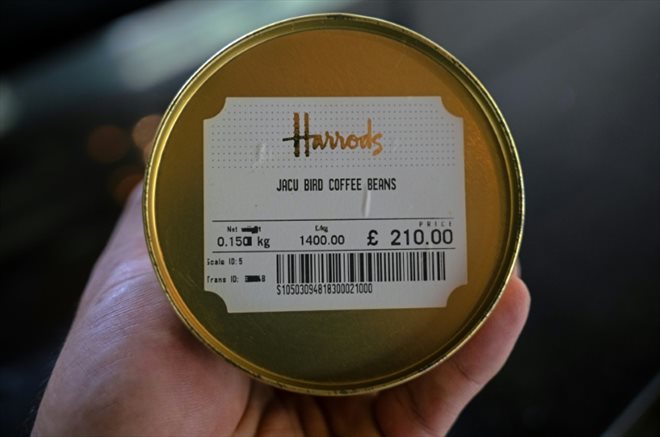An employee sifts coffee beans at the Camocim plantation on August 25, 2023 in Domingos Martins, in the state of Espírito Santo, Brazil (AFP/CARL DE SOUZA)
Brazil has not yet found the goose that lays the golden egg, but the grains extracted from the droppings of the jacu, a kind of pheasant that lives in the tropical forest, make it possible to produce one of the most expensive coffees in the world.
Fond of coffee “cherries”, the jacu is a gourmet: “he chooses the best fruits, the ripest”, explains to AFP Agnael Costa, 23, who delicately collects the precious droppings between two tree trunks .
On the Camocim farm, nestled in a bucolic hilly region in the municipality of Domingos Martins, in the state of Espirito Santo (Southeast), coffee grows in the middle of a lush forest.
“Without this model of sustainable agro-forestry cultivation, it would be impossible to produce jacu coffee,” explains the owner of the farm, Henrique Sloper, a fan of biodynamic agriculture.
A product sold for 1,118 reais (around 210 euros) per kg in Brazil, or even much more when it is exported abroad, where it is distributed among others by the British department store Harrods.
– “Natural habitat” –
But the jacu, a wild bird with black plumage and a scarlet throat, was not always welcome at the Camocim farm. At first, it was seen as a voracious parasite that threatened crops.

A Jacu in the Camocim coffee plantation, on August 25, 2023 in Domingos Martins, in the state of Espírito Santo, Brazil (AFP/CARL DE SOUZA)
It was by discovering “Kopi Luwak” coffee in a living room, made in particular in Indonesia from the excrement of a civet, a small mammal between a weasel and a wild cat, that Henrique Sloper had the idea of making jacuzzi. an “ally” rather than an enemy.
And if the reputation of “Kopi Luwak” – also sold at high prices – is darkened by denunciations of mistreatment of civets living in captivity, the Brazilian pheasant is free.
“It is completely in its natural habitat”, the Mata Atlantica (native forest of the Brazilian Atlantic coast), assures the farm’s production supervisor, Rogério Lemke.

Jacu droppings at the Camocim coffee plantation on August 25, 2023 in Domingos Santos, in the state of Espirito Santo, Brazil (AFP/CARL DE SOUZA)
“It’s a protected area (…), and we don’t use any chemicals” in the coffee plantation, he insists.
Jacu droppings look a bit like a coarse cereal bar, with the beige grains sticking out from a blackish pasty mass.
Once collected, it is dried in a greenhouse. The grains are then carefully sorted and hulled, before being placed in a cold room.
“It requires a lot of work, that’s why we sell it so expensive. It’s impossible to make jacu coffee at low cost. It’s a rare product, and production is uncertain, because it depends of the appetite of the Jacu”, affirms Henrique Sloper.

Jacu droppings left to dry in a greenhouse at the Camocim coffee plantation, on August 25, 2023 in Domingos Santos, in the state of Espirito Santo, Brazil (AFP/CARL DE SOUZA)
Coffee extracted from pheasant excrement represents less than 2% of the total production of his estate.
“It also helps us identify the best time for conventional picking. When it eats, it means that the grains are ripe,” he continues.
– “New experience” –
“The jacu’s intestinal transit is extremely rapid, lasting just a few seconds,” explains Ensei Neto, a leading coffee expert.

Employees collect Jacu droppings at the Camocim coffee plantation on August 25, 2023 in Domingos Santos, Espirito Santo state, Brazil (AFP/CARL DE SOUZA)
It is much slower in the civet, or in the elephant, whose dung is also used to produce this type of coffee in Thailand.
“In terms of taste, there is therefore no particular contribution, it is above all a good story to tell. The only major difference is that he selects the best beans, because he is guided by the “survival instinct,” he adds.
And since the beans are very ripe, this gives “a coffee with sweet notes, with good acidity”.
“This coffee is delicious and the story behind its production is very original. It’s a new experience for us,” says Poliana Cristiana Prego, a 37-year-old Brazilian tourist who came to taste the jacu coffee on the farm.

A can of jacu coffee and its sale price at Harrods, on August 25, 2023 at the Camocim plantation in Domingos Martins, in the state of Espirito Santo, Brazil (AFP/CARL DE SOUZA)
“Our customers are lovers of exotic products, but also people for whom the notion of sustainable development is important,” notes Henrique Sloper.
For him, “the future of coffee is in Brazil”. The world’s leading producer, the South American giant “is starting to sell its image better, to show that it is capable of making coffee like nowhere else.”
© 2023 AFP
Did you like this article ? Share it with your friends using the buttons below.




